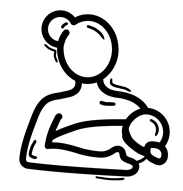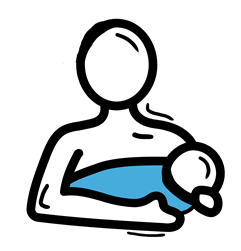The nine months of pregnancy are divided into blocks of three months called ‘trimesters’. This helps make it easier to describe all of the changes happening during pregnancy and helps parents know what to expect.
Recently the three months after the baby is born has become known as the ‘fourth trimester’. This makes it easier to describe the many changes happening for babies and parents in the early days after birth.
the three months after the baby is born has become known as the ‘fourth trimester’. This makes it easier to describe the many changes happening for babies and parents in the early days after birth.
When babies are newborn they continue to grow and develop at a fast rate physically and emotionally. The first three months is a period of a lot of change for parents too and it takes time to get used to.
It might sometimes feel like you should get back to ‘normal’ after your baby is born. Seeing these first few months as a time to recover, adapt and get to know your baby can take the pressure off.
Although the reality can be tougher than you expected you had probably been told about the practical changes a new baby brings. Some of the physical changes that happen after childbirth can come as a bit of a shock.
For Parents
You have just been through a big life event. Alongside the lovely ‘baby bubble’, having a new baby in the house is emotionally and physically demanding. It can put pressure on you and on your relationships. It will take time for things to begin to fall into place.
It might be a bit easier if you;
If everyday feels hard and it is getting in the way of you enjoying your baby speak to your midwife, health visitor or GP. You will not be judged and you don’t have to struggle on without support.
For Babies
Leaving the warm, dark womb and arriving in a bright, noisy world must be a big shock. Babies have to get used to feelings like, hunger, discomfort and loneliness. Babies cannot meet any of their own needs and still aren’t quite sure who they can rely on. It is not surprising that it takes some time for them to settle down.
Remember - every baby is different
Taking time to get to know your baby and looking at things from your baby’s point of view can help you guess what they might need from you. When you are sensitive to your baby's feelings they learn to trust that they always have you on their side to help them.
Calling the time between birth and three months the ‘fourth trimester’ is a good reminder of all the changes that happen for babies. They rely on you to help them feel safe and get more confident.
You can help your baby through this stage by;
Self-Care
Having a baby is an amazing and emotional time. It can also bring with it big changes. You need to recover from giving birth and it might sometimes feel overwhelming.
a baby is an amazing and emotional time. It can also bring with it big changes. You need to recover from giving birth and it might sometimes feel overwhelming.
As with all stages of early parenthood, it’s worth remembering that this stage will pass. In what seems no time at all, you might be looking back at the period with fondness at how tiny and attached to you your baby was when they were first born.
You may feel that the first 3 months are really tough and you’re constantly one step behind your little one. But it's important to also take time to look after yourself.
Make sure you eat and drink
If you are breastfeeding, your body burns even more energy. Make sure you stay hydrated and get enough to eat to help your body recover.
Say 'no' to visitors when you need to
If you are feeling overwhelmed, sometimes having too many visitors can be stressful. Be honest with your guests if you want some time alone with your baby.
Go for walks
Even if you aren't feeling up to full exercise yet, a small walk in the fresh air can be really good for energy and mood.
Watch your favourite tv show
Don't forget your body is still recovering and sitting back relaxing on the sofa is a good way to let your body heal.
Don't be afraid to ask for help
Ask for help from friends, relatives or neighbours. They will be delighted to meet your new baby and help you out.
Exercise
Pregnancy and childbirth cause a lot of physical and emotional changes. You may have been able to maintain or improve your fitness during pregnancy or it may have been more difficult. You may have had a straightforward delivery and recover quickly, or it may have been more complicated and take longer.
Vaginal Bleeding
After your baby is born the blood and tissue left behind in the womb will come away as a vaginal loss. This is like a very heavy period, containing bright red blood and some clots in the early days. Bleeding should reduce up until 10 days after birth and by 14 days should be stopping. If bleeding continues to be heavy after 10 days, please contact your Midwife before your last postnatal visit
It then changes colour and the amount reduces.
Read about what loss to expect in the first days and weeks
Speak to your GP, midwife or health visitor if you have postnatal bleeding and any of these;
These could be a sign of infection.
Make sure you know the signs of a serious heavy bleed after giving birth (postpartum haemorrhage, or PPH). This is rare and needs emergency care.
Call 999 if you've got postnatal bleeding and;
This could mean you're having a very heavy bleed (postpartum haemorrhage) and need emergency treatment.
If you cannot make voice calls, you can now contact the 999 emergency services by SMS text from your mobile phone. Emergency SMS is part of the standard 999 service which has been designed specifically for people with hearing loss or difficulty with speech.
After Pains
During pregnancy your womb grows to about 25 times its normal size. After birth it has to ‘contract’ back down to near its usual size (it never goes quite back to pre-pregnancy size).
In the first few days you may experience ‘after pains’ that feel a bit like milder contractions / period pain. The pains can be a bit stronger as you breastfeed (breastfeeding helps your womb return to size more quickly).
Pains usually fade over first few days. By 4 -6 weeks the womb size is back to its new normal. If the pains feel very strong or are worrying you talk to your midwife or call 111 for advice.
Night Sweats
The  changes in hormone levels after pregnancy can cause ‘night sweats’ - where you wake in the night sweating a lot. You might also experience this in the day. It tends to be worse in the first couple of weeks but can last longer, particularly if you are breastfeeding.
changes in hormone levels after pregnancy can cause ‘night sweats’ - where you wake in the night sweating a lot. You might also experience this in the day. It tends to be worse in the first couple of weeks but can last longer, particularly if you are breastfeeding.
If you feel unwell alongside the night sweats, or if they are a big problem and / or goes on for a long time speak to your GP. Sometimes it can be a symptom of other things.
Hair Loss
During pregnancy the hormones mean that the usual natural hair loss slows right down.
After delivery hormone levels get back to normal. This then causes you to shed the hair that you had held on to. It can feel like a lot of hair but it is a normal process and settles over the first year.
If you are worried that the amount of hair you are losing is causing bald patches, you can talk to your GP.
If you feel worried and would like more advice you can speak to your midwife throughout your pregnancy and up to 28 days after the birth of your baby.
If you live in Norfolk
If you live in Suffolk
Other parents who are going through or have been through this before can be a big help. You could join our online forum to speak to other Norfolk Parents below.